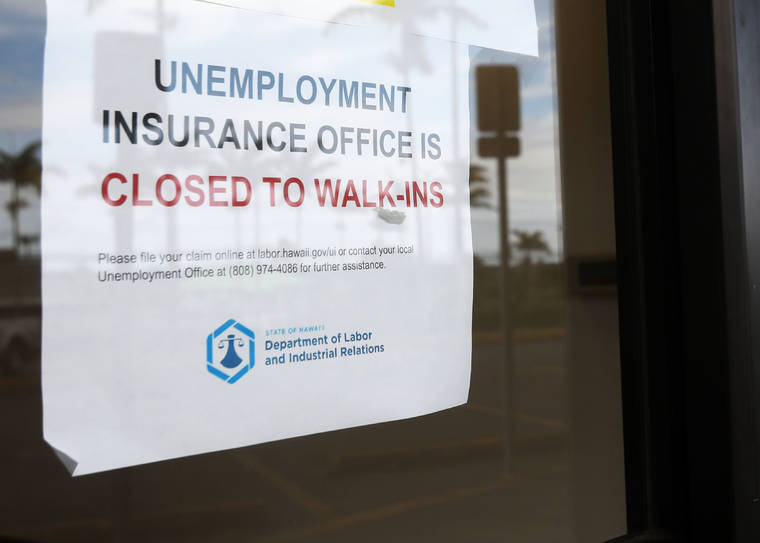The state’s tech chief briefed the state Senate Special Committee on COVID-19 Monday on what’s being done to alleviate an outmoded and overloaded computer system handling unemployment claims, while the committee unloaded on the governor’s chief of staff about the pace of repurposing idled state employees to help take phone calls for the Unemployment Insurance Division.
Chief Information Officer Douglas Murdock said the IBM mainframe computer that services claims is using a “20-year-old application written in some (computer) languages that aren’t being used much anymore.”
“We have been making a lot of upgrades to the mainframe to try and help the unemployment insurance application,” Murdock told committee members.
Computer crashes and telephone trunk line overloads have caused delays in getting checks to many filing initial jobless claims. Between March 1 and April 9, more than 200,000 claims were filed statewide, with more than 13,500 of them coming from the Big Island.
Murdock noted an online claims form, which can be accessed at https://huiclaims.hawaii.gov/#/, had to be deployed to lessen the burden on the mainframe.
“One thing we did was to put on another web form so they could just fill out the form and send that in so they didn’t necessarily have to connect to the mainframe. And we’re seeing about five times as many applications come in that way as come in directly through the mainframe,” Murdock said. “We’ve upgraded every bit of speed that we could in the mainframe to give unemployment insurance the highest priority on the mainframe.
“… Their initial time to process from a normal claim to a payment was about 21 days, I understand. They’re doing everything they can to shrink that to as few days as possible instead of letting it grow.”
Filers whose completed “clean claims” — those applications without errors or missing information — should get confirmation notes with their claim numbers if their claim went directly into the mainframe. Information from filers on the separate web form has to be inputted into the mainframe manually, and those filers will get a confirmation message, but will not immediately receive a claim number.
“Unless they’ve fixed it in the last week-and-a-half, they get that message, ‘Congratulations, you’ve completed your claim. You’ll get your claim number shortly,” Sen. Michelle Kidani told Murdock. “And the shortly was, for my daughter-in-law, seven days later.”
Murdock said programming for $600 weekly supplemental federal payments to unemployment claimants and pandemic unemployment assistance claims to so-called “gig economy” workers hasn’t yet been inputted, and has to be done manually.
He said he’s also “talking to other states to see if they have the ability to process some of our claims” and is seeking information technology help from other state departments and private sources. He acknowledged one senator’s suggestion to talk to the University of Hawaii, which he hadn’t yet done, as “a good idea.”
According to Murdock, replacement of the computer system has been in the works but is likely “about a year away.”
While senators were generally polite with Murdock, they were less so with Linda Chu Takayama, Gov. David Ige’s chief of staff, whom some blamed for not doing enough quickly enough to get state workers who have been declared nonessential and furloughed at home, with pay, to help the Unemployment Division with claims that need follow-up by phone.
Several noted that 40 legislative staffers were volunteered to help, but turned down by Takayama.
“I’m not sure why you decided to not allow the Senate and House staff to help, especially with so many people who need their checks. They’re having a difficult time accessing online; nobody’s answering the phone,” said Sen. Donovan Dela Cruz.
Takayama replied she wanted to first use nonessential workers, saying 706 have been identified, and cited “privacy issues with information that’s transmitted through the UI process.”
“Like what?” Dela Cruz asked, and noted 18 repurposed employees who are now manning phones for the Unemployment Insurance Division.
“Clearly, two weeks ago, there was a background check. We could’ve had our people go through that,” he said.
“We keep getting these excuses,” added Sen. Donna Mercado Kim. “… So why did it take us so long to identify 706 individuals, state workers, that are at home getting paid all this time and not doing anything? You know, I get these emails from people crying about the fact that they can’t even get through the line. They can’t even get a confirmation. They can’t pay the bills. It’s gut-wrenching to me to hear these people. Because we’ve got (employees) being paid and they can’t even get unemployment.”



